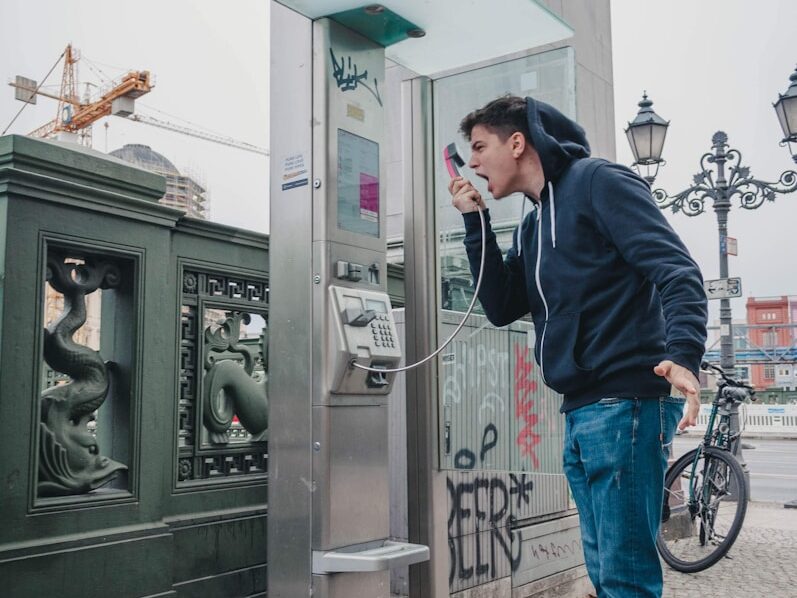
People often judge you by the way you speak long before they know your full character, and certain phrases can chip away at the respect others have for you without you even noticing. They might sound harmless or casual, but over time, they make you seem less capable, less confident, or less trustworthy. Here are 15 phrases worth avoiding if you want to keep people’s respect intact:
“That’s not my problem.”

We know it’s fair to have boundaries but saying this outright makes you seem selfish and unwilling to be part of a solution. It tells people you’re not a team player and have no real interest in helping unless it directly benefits you. Even if you can’t personally fix an issue, showing empathy or offering small suggestions goes a long way. Respect grows when people know you care (even when you can’t solve everything).
“I don’t care.”

This phrase instantly closes the door to meaningful connection. Even if you truly feel indifferent about a topic, saying you don’t care makes it sound like the person or situation doesn’t matter to you at all. It can come across as very cold, dismissive, and unkind. People respect those who can stay engaged or at least acknowledge someone’s effort, even when they aren’t personally invested.
“That’s just how it is.”

This phrase shuts down conversation and makes you seem unwilling to think critically or consider other perspectives. It comes across as lazy reasoning, as though you can’t be bothered to challenge the status quo or explore solutions. People will respect you if you can think beyond what’s “normal” and stay open to different ideas.
“I’m just better at this than you.”

Even if you are more skilled, saying it this way will only make you sound arrogant and belittling. People respect confidence, but they lose admiration quickly when it turns into condescension. A better approach is to offer help or share your knowledge without rubbing your abilities in someone’s face. Respect comes from lifting others up, not making them feel small.
“Whatever.”

It’s a very short word, but it’s incredibly cutting. Throwing “whatever” in conversations shows that the other person’s thoughts don’t matter to you at all. It can leave the impression that you’re dismissive or super proud to compromise. People respect those who show interest in dialogue, not those who end it with a shrug.
“You wouldn’t understand.”

This instantly puts the other person down by implying they lack intelligence, experience, or the capacity to keep up. Even if you think someone might not grasp the full picture, shutting them out with this phrase creates distance and resentment. Respect is built when you include others and explain your point in a way they can follow instead of keeping them in the dark.
“Calm down.”

Few phrases are more likely to make tensions worse than this one. It suggests you’re more concerned with controlling someone’s reaction than understanding why they feel the way they do. Telling someone to calm down can make them feel dismissed and unheard. People respect those who take the time to listen and respond with empathy rather than trying to shut emotions down.
“That’s stupid.”

Calling someone’s idea or opinion “stupid” is a quick way to lose their respect. It makes you seem rude, impatient, and unwilling to hear them out. Even if you strongly disagree, you can express that without insulting the person directly. Disrespect grows from careless words, but respect grows from thoughtful, considerate dialogue.
“I don’t need your opinion.”

Saying this makes it sound like you’ve already decided you know best and don’t value input from others. Even if you’ve made up your mind, showing openness to hearing different viewpoints shows that you are mature. When people feel their voices aren’t valued, they’re far less likely to respect you in return. So listen to different opinions and acknowledge them.
“It’s not my fault.”

While it’s very important to clarify responsibility, saying this too quickly can make you look defensive and unwilling to take any accountability. People respect those who can acknowledge their role in a situation, even if they weren’t the main cause. Owning your part (even if it’s small) shows strength and maturity, while refusing to do so comes across as evasive.
“I’m just being honest.”

Often, this is followed by something unnecessarily harsh or cruel. It’s a way of hiding behind “honesty” to justify unkindness. True honesty doesn’t require tearing someone down; it’s possible to be truthful and respectful at the same time. People quickly lose respect for those who confuse bluntness with rudeness.
“Lighten up.”

This phrase minimizes someone’s feelings and suggests they’re being unreasonable for caring. It can come off as condescending, as though you’re above the situation and they’re overreacting. Respect is present when you try to understand why that particular thing or object matters to someone instead of dismissing it as something unimportant.
“I already told you.”

Saying this with an impatient tone can make the other person feel embarrassed or unintelligent for not remembering. People process information differently, and respectful communication allows for clarification without judgment. A little patience goes a long way in keeping respect intact.
“You’re lucky I’m here.”

This phrase creates an unbalanced dynamic, as if your presence is some kind of rare gift they should be grateful for. It makes you sound self-important and dismissive of the other person’s time or effort. Mutual respect means seeing each other as equals, not one doing the other a reluctant favor.
“That’s beneath me.”

Dismissing a task or request with this phrase can make you seem arrogant and unwilling to contribute. Even if something isn’t in your skill set or job description, showing a willingness to help earns more respect than acting like certain things are too trivial for you. People value humility and cooperation far more than superiority.

